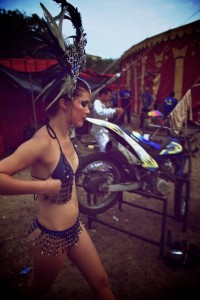 Yecid’s clothes don’t fit him right, his shoes are four sizes too large, his left wrist sometimes pops out of place and always aches with arthritis. The mangled joint is a painful reminder of a fall he suffered at work. At the same job he’s had more than forty years, where every night his employer beats him and a gathered crowd of spectators applaud his humiliation.
Yecid’s clothes don’t fit him right, his shoes are four sizes too large, his left wrist sometimes pops out of place and always aches with arthritis. The mangled joint is a painful reminder of a fall he suffered at work. At the same job he’s had more than forty years, where every night his employer beats him and a gathered crowd of spectators applaud his humiliation.
This may seem exploitative, but Yecid has passion for a craft he hopes others find silly. He’s a clown in the Darix Togni Italian National Circus. His employer is the tiger-tamer and both say the Circus is more than work, it is a culture, a family and a lifestyle they will perpetuate.
“When you are born into it (the circus). It is a part of you, it’s in your blood,” Yecid says. He sits on a concrete park bench between two temporary alligator ponds. He’s forty-five and at this point has done every job under the big top. In addition to clown duties he is also the crew’s chief animal wrangler and makes nightly cameos with the trapeze act. “The circus gives me joy, I live for the adventure.”
This clown’s nomadic path began at birth in a caravan in Venezuela. His father was a trapeze artist and his mother dazzled audiences with graceful precision on the aerial silks (aka ribbon trapeze). “Her performance was the most beautiful,” he says, pausing a moment to wipe nostalgic tears from his face. “All eyes in the crowd were on her. It inspired me.”
As a toddler, he takes his first steps into the performance ring. The act is child- clown, but by five he is on the trapeze and in his teens he is seen on television screens across South America.
“I became famous, people in the streets of towns I’d never walked knew my name.” Yecid’s performance is an intense display of refined acrobatics executed above the heads of frenzied fans. During one of these spectacles his hand slips. Momentum carries him outside the net while gravity brings him down with force. He attempts to break his fall but his left arm shatters on impact. The accident leaves him with broken ribs, bruises and an arm no longer capable of intense trapeze maneuvers.
The last moments before showtime are critical. Backstage is an open-air yard fortified by strategically placed shipping containers, fences and temporary animal enclosures where five tigers, two alligators and one kangaroo watch the performer’s final preparations. A group of men converse in Spanish and Italian. They spin wrenches, tell jokes and fine tune the motorcycles used in the “Globe of death” act. Circo showgirls Astrid, Alessandra and Alissa plume their head-dresses while others gather around an octagonal pedestal beneath a canopy. Vera, a Brazilian acrobat, goes through a yogic stretch routine while Mongolian contortionists Inga and Tsatsral apply shimmered eye make-up to their faces. Martina, a blonde Italian clown, and Ali, the resident mystic, sit on the edge of the octagon. The pair are already painted and take a few moments to entertain a baby while the child’s parents prepare. The infant is the seventh generation of Togni to travel with the circus. His parents are Francisco, the strong man, and Elis Togni, the solo trapeze artist.
“It’s an extended family,” says Elis, in a pleasant maternal voice. “We look out for each other, help each other.” She scans the group of artists gathered before her, “I know if I need help with the baby they are here. And they know they are safe and protected. If an outsider caused a problem it would be handled.”
 The family patriarch is tiger-tamer and master of ceremonies Davio Togni. He and his brother Livio, a former Italian National Senator, keep a watchful eye over the circus and its naturalized offspring. This family tradition descends from a legendary Italian performer.
The family patriarch is tiger-tamer and master of ceremonies Davio Togni. He and his brother Livio, a former Italian National Senator, keep a watchful eye over the circus and its naturalized offspring. This family tradition descends from a legendary Italian performer.
“In Milan, Darix Togni is synonymous with Circus,” says trapeze artist Daniel Togni, while reviewing the playlist for the night’s performance. He is the son of Davio, brother of Elis and heir apparent. “Darix was the first man in Italy to master the art of animal taming.” Daniel never met his famous ancestor, but the family moniker has defined much of his life. From youth, he studied circus performance in Italy, and the United States where his mother works as a costume supervisor for Cirque de Soleil. “Traveling with the circus is never boring,” he says.

It has been forty-four years since the Togni family last appeared in Ghana. Times have changed, and the entertainment market is unforgiving. In the interval several major circuses closed their tents permanently. However, the Togni’s continue to electrify their audience. At times the journey takes them into exotic, conflicted, and dangerous territory. In 2009, the circus was nearly stolen in Iran when an opportunist sponsor used the Twitter Revolution as an excuse to keep their tent and everything in it. They were forced to
escape on a late night cargo ship organized by Uncle Livio and spent the next year entertaining a mysterious Oil Sheik in Qatar.
The Togni family owns a three uniquely arranged circuses. “When we come to places like this (Ghana) we bring the small circus. This is most peoples first time, so they are still amazed by the traditional acts.” The family business is headquartered in Lombardy, Italy. Their home-base is a large compound house on a ranch where family, friends, performers, giraffes, elephants and tigers are a welcome and common. But many of these performers haven’t seen home in years. Constant travel can weigh heavily on group dynamics and mileage with animals, artists and loads of burdensome equipment can revert to utter chaos.
 Patriarch and animal trainer Davio, has a substantial scar on his abdomen. When asked how he got it he is quick to redirect the discussion. His son Daniel is more willing to tell the story. “He didn’t get it from the tigers,” he says with a laugh. The wound was left by one of two Brazilian brothers, once a part of the Togni’s circus. “It was the moto-boys. They were with the circus a while but they were drunkards,” says Daniel. “One night, they got drunk and one punched up his girlfriend’s face (a fellow performer- name withheld),” says Daniel, shifting to a serious tone. “My Father was teaching him a lesson when the other brother stabbed him.” He says, thrusting his right arm in front of him. “They took off and left my father with the knife still in him.”
Patriarch and animal trainer Davio, has a substantial scar on his abdomen. When asked how he got it he is quick to redirect the discussion. His son Daniel is more willing to tell the story. “He didn’t get it from the tigers,” he says with a laugh. The wound was left by one of two Brazilian brothers, once a part of the Togni’s circus. “It was the moto-boys. They were with the circus a while but they were drunkards,” says Daniel. “One night, they got drunk and one punched up his girlfriend’s face (a fellow performer- name withheld),” says Daniel, shifting to a serious tone. “My Father was teaching him a lesson when the other brother stabbed him.” He says, thrusting his right arm in front of him. “They took off and left my father with the knife still in him.”
Davio lost a lot of blood but remained conscious and strong enough to find medical attention. The brothers fled to the nearest Brazilian embassy, leaving their bikes and other articles behind. The incident left the Togni family’s leader in hospital, a female artist unable to perform and no-one able to execute the final act. Rather than shut the tent, the crew rallied together. The Wonderboys, a pair of
 juggling, tight rope walkers from Colombia decided to give the Globe of Death a shot. By the time Davio was released the pair had mastered the act and perform it nightly ever since. “This is the way in the circus,” says Daniel.
juggling, tight rope walkers from Colombia decided to give the Globe of Death a shot. By the time Davio was released the pair had mastered the act and perform it nightly ever since. “This is the way in the circus,” says Daniel.
Now, Yecid has performed with the Togni family’s circus for more than two years and his clowning has brought smiles to international faces of all ages. He sleeps backstage in a shipping crate cluttered with over-sized wardrobe changes, prop jokes and other more banal necessities of life. He has five children of his own, all in Venezuela, some in the circus and others who are not. “It is their decision, I would never force them into this life. But they know it is the only life for me.”




